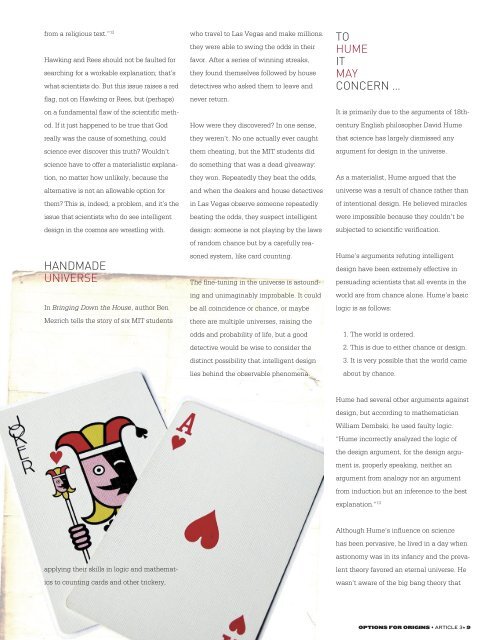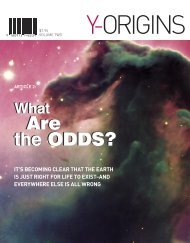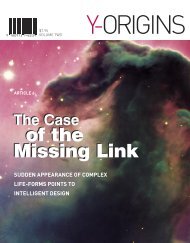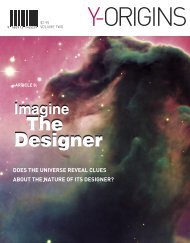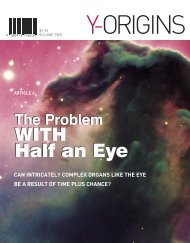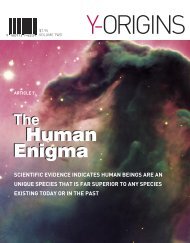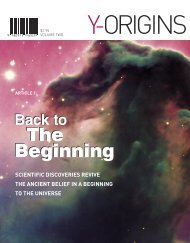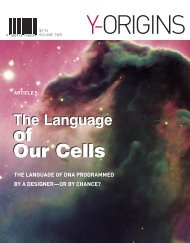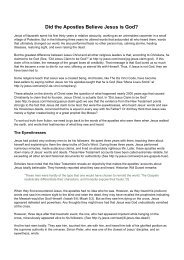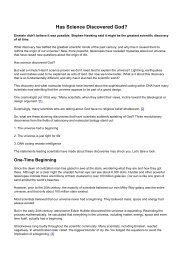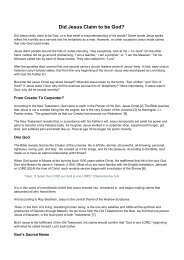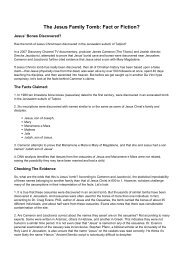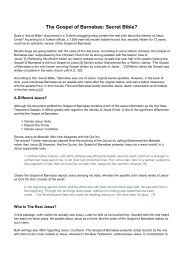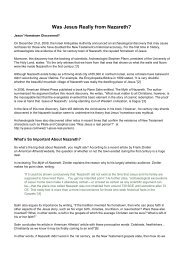Origins3
Create successful ePaper yourself
Turn your PDF publications into a flip-book with our unique Google optimized e-Paper software.
from a religious text.” 12<br />
Hawking and Rees should not be faulted for<br />
searching for a workable explanation; that’s<br />
what scientists do. But this issue raises a red<br />
flag, not on Hawking or Rees, but (perhaps)<br />
on a fundamental flaw of the scientific method.<br />
If it just happened to be true that God<br />
really was the cause of something, could<br />
science ever discover this truth? Wouldn’t<br />
science have to offer a materialistic explanation,<br />
no matter how unlikely, because the<br />
alternative is not an allowable option for<br />
them? This is, indeed, a problem, and it’s the<br />
issue that scientists who do see intelligent<br />
design in the cosmos are wrestling with.<br />
HANDMADE<br />
UNIVERSE<br />
In Bringing Down the House, author Ben<br />
Mezrich tells the story of six MIT students<br />
who travel to Las Vegas and make millions.<br />
they were able to swing the odds in their<br />
favor. After a series of winning streaks,<br />
they found themselves followed by house<br />
detectives who asked them to leave and<br />
never return.<br />
How were they discovered? In one sense,<br />
they weren’t. No one actually ever caught<br />
them cheating, but the MIT students did<br />
do something that was a dead giveaway:<br />
they won. Repeatedly they beat the odds,<br />
and when the dealers and house detectives<br />
in Las Vegas observe someone repeatedly<br />
beating the odds, they suspect intelligent<br />
design: someone is not playing by the laws<br />
of random chance but by a carefully reasoned<br />
system, like card counting.<br />
The fine-tuning in the universe is astounding<br />
and unimaginably improbable. It could<br />
be all coincidence or chance, or maybe<br />
there are multiple universes, raising the<br />
odds and probability of life, but a good<br />
detective would be wise to consider the<br />
distinct possibility that intelligent design<br />
lies behind the observable phenomena.<br />
TO<br />
HUME<br />
IT<br />
MAY<br />
CONCERN …<br />
It is primarily due to the arguments of 18thcentury<br />
English philosopher David Hume<br />
that science has largely dismissed any<br />
argument for design in the universe.<br />
As a materialist, Hume argued that the<br />
universe was a result of chance rather than<br />
of intentional design. He believed miracles<br />
were impossible because they couldn’t be<br />
subjected to scientific verification.<br />
Hume’s arguments refuting intelligent<br />
design have been extremely effective in<br />
persuading scientists that all events in the<br />
world are from chance alone. Hume’s basic<br />
logic is as follows:<br />
1. The world is ordered.<br />
2. This is due to either chance or design.<br />
3. It is very possible that the world came<br />
about by chance.<br />
Hume had several other arguments against<br />
design, but according to mathematician<br />
William Dembski, he used faulty logic.<br />
“Hume incorrectly analyzed the logic of<br />
the design argument, for the design argument<br />
is, properly speaking, neither an<br />
argument from analogy nor an argument<br />
from induction but an inference to the best<br />
explanation.” 13<br />
applying their skills in logic and mathematics<br />
to counting cards and other trickery,<br />
Although Hume’s influence on science<br />
has been pervasive, he lived in a day when<br />
astronomy was in its infancy and the prevalent<br />
theory favored an eternal universe. He<br />
wasn’t aware of the big bang theory that<br />
OPTIONS FOR ORIGINS • ARTICLE 3• 9


